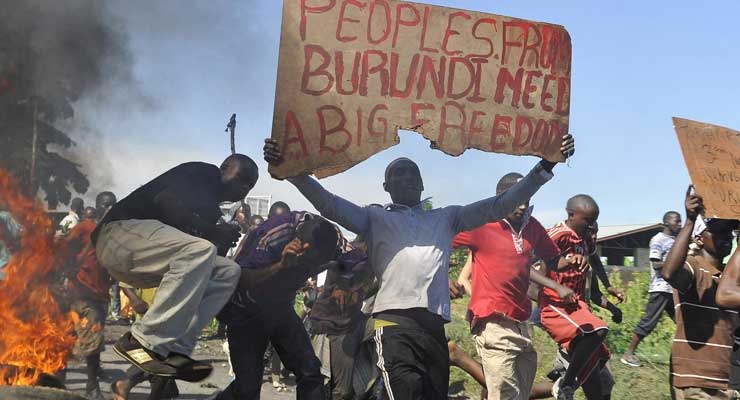
As the United Nations and Western countries continue to struggle with ending the ongoing Syrian Civil war and the turmoil that has caused within the region, a new issue has arisen over the last couple of years which may threaten to divide the organization’s attention: election violence in many African countries has threatened to stop the spread of democracy over the continent. And growing Burundi violence is just one example.
“Leaders should never use undemocratic constitutional changes and legal loopholes to cling to power. We have all seen the tragic consequences when they do” UN Secretary Ban Ki-moon told a gathering of African leaders at the AU summit on Saturday January 30th.
The continent has been struggling with increased violence over the past years as numerous leaders have attempted to change their constitutions to allow them to either extend their term directly or to allow them to run for another term. An example of this happening is in Burundi, where President Pierre Nkurunziza held elections in May for a possible third term despite numerous objections and protesters saying that exceeded the Burundi constitution.
“We have all seen the tragic consequences when they do” Secretary Moon continued in his statement.
The citizens of Burundi were forced to go to the polls, following a failed military coup attempt in April 2015 where several former and current government officials attempted to overthrow the president who has been in power since August 2005. (The actual coup attempt took place on April 30th, 2015.).
“I do not want to return with the ink on the finger” one Burundi voter said, who did not want to be identified fearing the ongoing violence in the country.
As many as eight candidates have appeared on the ballot but many have withdrawn due to lack of coverage and the inevitability of the longtime president winning. Opposition leaders have also been killed in recent months, like Zedi Feruzi who was assassinated in a drive by shooting in May.
“The life of anyone who opposes Pierre Nkurunziza is in danger” Agathon Rwasa, who opposes the president, said. “People are being assassinated here and there” Mr. Rwasa continued.
According to the Burundi Constitution, the President can serve only two, full terms (which are five years in length.).
The violence has been the worst during the summer months immediately prior to the July 21st elections and after in late July and throughout the month of August, as supporters of both sides took to the streets and at times attacked each other.
“Treating largely peaceful demonstrators and entire residential areas as part of an insurrection was counterproductive and escalated rather than defused protest” a press released by Amnesty International read.
The president received 69.41% of the vote but 87 people died in violence on December 11th when the situation in the country escalated across the nation. John Kirby, the U.S State Department spokesmen said that Burundi, “Risks legitimacy in the eyes of its citizens and the international community”.
The violence in Burundi and throughout the continent of Africa is not healthy for the prospects of democracy as there should be a peaceful transition of power from regime to regime and the Presidents should not use democratic measures to help prolong their stay in power if the will of their people is to have a change in leadership.
Links to sources:
1) Burundi Election Article: https://www.theguardian.com/world/2015/jul/21/burundi-election-polls-open-president-nkurunziza-violence
2) Murdered Opposition Figure Article: https://www.theguardian.com/world/2015/may/25/thousands-attend-funeral-for-murdered-burundi-opposition-leader-zedi-feruzi
3) Burundi President Claims Victory: https://www.theguardian.com/world/2015/jul/24/burundi-pierre-nkurunziza-wins-third-term-disputed-election
4) 87 Burundi Residents Die in Election Violence: https://www.bbc.com/news/world-africa-35083823
Leave a Reply